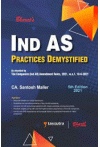- Author(s): CA Santosh Maller
- Publisher: Bharat Law House
- Edition: 5 Ed 2021
- ISBN 13 9789390854882
- Approx. Pages 1232 + Contents
- Format Paperback
- Approx. Product Size 24 x 16 cms
- Delivery Time 3-5 working days (within Kerala & South India) (Others 7-9 days)
- Shipping Charge Extra (see Shopping Cart)
As Amendment by The Companies (Ind AS) Amendment Rules, 2021, w.e.f. 18.6.2021
............................................................................................................................
Description
Indian Accounting Standards (Ind AS) transition has been a colossal change in the financial reporting landscape in India ensuring convergence of our accounting standards with International Financial Reporting Standards (IFRS), Ind AS transition since FY 2016-17 in phases had significant impact on, not only, the financial results of many of the companies, but has also caused far reaching consequential business impact. Many companies reported a change in their key financial ratios, such as, earnings per share, price-earnings ratio, return on capital employed and gross margin ratio. The new requirements under Ind AS with regards to classification of debt and equity caused changes, such as, net worth, debt-equity ratio and interest coverage ratios. Companies were initially spooked by the uncertainties around tax consequences of the Ind AS. In many cases, there have been significant regulatory issues, such as, power and infrastructure companies potentially meeting the criteria for NBFCs, control assessment under Ind AS being different from that under regulations such as Companies Act, IRDA, SEBI takeover code, etc. Non-banking finance companies (NBFCs) with net worth exceeding Rs. 250 crores and listed NBFCs are required to transition to Indian Accounting Standards (Ind AS). The holding, subsidiary, associate and joint venture companies of the covered companies also have to transition to Ind AS in the same year. The Reserve Bank of India deferred Ind AS transition for banks indefinitely, due to the necessary legislative amendments - to make the format of financial statements, prescribed in the Third Schedule to the Banking Regulation Act, 1949, compatible with accounts under Ind AS - are still under consideration. Ind AS 116 Leases, represents a fundamental change in lessee accounting by requiring lessees to recognize generally all the leases on the balance sheet.
Highlights
• Practical insights along with real-life implementation experiences of Ind AS Companies
• Ind AS and IFRS experiences and analysis based on published financials of listed
• Complex Ind AS accounting issues explained with simple examples and journal entries
• Simplified & Concise summaries of Key Ind AS standards
• Separate chapter on Covid disclosures
............................................................................................................................
Contents
Part I Ind AS Summaries
Part II Practical Issues in Implementation of Ind AS
Chapter 1 : Adoption Issues
Chapter 2 : Ind AS Application Issues Related to Assets
Chapter 3 : Ind AS Application Issues Related to Liabilities
Chapter 4 : Ind AS Application Issues Related to Income and Expense
Chapter 5 : Financial Instruments
Chapter 6 : Business Combinations and Consolidation
Chapter 7 : Presentation Issues
Chapter 8 : Disclosure Considerations
Chapter 9 : Sector-Specific Ind AS
Chapter 10 : MAT Computation for Ind AS Companies
Chapter 11 : Key Differences between Accounting Standards and GST
Chapter 12 : Key Ind AS Impact Areas for Non-Banking Financial Companies
Chapter 13 : COVID-19 Pandemic : Financial Reporting Aspects
Part III Appendices
Appendix 1. Case Study on Illustrative Ind AS Financial Statements
Appendix 2. Financial Reporting Implication of Schedule III Amendment
............................................................................................................................
Author Details
Santosh Mailer
The author is an Associate Chartered Accountant, having secured rank in CA exams, with about 16 years of extensive experience in Accounting, Audit and Assurance fields. He has worked with several diverse companies, Indian and multinational companies, on IFRS and Ind AS GAAP conversion engagements, in India and overseas, in manufacturing, trading, telecom, real estate, shipping and logistics. He has been a member of IFRS desk/accounting technical professional practice group of a big audit firm for over 8 years. He has had stint in London, during which he was closely associated with the IFRS standard-setting projects of the International Accounting Standards Board, such as, revenue, leases and financial instruments.
............................................................................................................................

